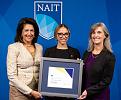Marketing Coordinator
- FMA
- The Fabricator
- FABTECH
- Canadian Metalworking
Level up with government funding
Your business may be eligible for government grants and loans to offset hiring, training, expansion, technology, innovation costs
- By Alena Barreca
- November 10, 2020
You may know that Canadian government funding programs are available for your business, and maybe you’ve even applied for grants and loans in the past, but the funding landscape is vast and often complicated, with hundreds of programs that each have their own unique deadlines, expectations, applications, and allocations.
Funding programs are available federally, provincially, and territorially, and gaining an in-depth understanding of these incentives, including their purpose, timing, and what they look for in applications, can be incredibly difficult for most businesses.
Types of Funding
Four of the most common project types supported through government funding follow.
Business Expansion. Have you ever thought about expanding your manufacturing business into other countries? It takes considerable knowledge and financial resources to scale your business globally, but developing a growth strategy that includes government funding is a strong step toward a sustainable and achievable expansion.
A variety of government grants and funding programs can help offset the costs of purchasing equipment for exporting, producing certifications for industry standards, participating in international tradeshows, trade missions, translating materials, performing marketing research and analysis, and hiring international market development assistance.
Capital and Tech Adoption. Capital investment funding is available to support Canadian businesses that want to focus on technology and software adoption projects.
As opposed to business expansion funding, which generally focuses on larger expansion projects that are completed over multiple phases, capital investment grants and loans tend to support specific projects that are directly related to improved business performance. Companies can access technology funding programs at both the federal and provincial level to offset project costs, which enables them to purchase innovative technologies sooner than would be possible by only using cash flows.
Research and Development. R&D activities support innovation and enable Canadian companies to achieve competitive advantages over other domestic and international firms. These types of activities are not just for research-focused companies and large businesses with substantial budgets, but also for smaller companies that seek an edge over products and services that currently dominate the market.
Innovation is a mindset that businesses must adopt to remain a viable choice for customers; without R&D, there will eventually be options available to your client base that are more appealing than your offerings.
Fortunately, Canadian government funding is available to offset R&D costs and help companies stretch their research budgets.
Hiring and Training. A business is truly only as strong as its team. If shops are planning on expanding or developing their workforce, Canadian government grants exist for small-business recruitment activities to ensure they have qualified workers and the requisite skills and capabilities to support ongoing and future business plans.
Funding programs can help organizations hire or retrain staff, improve their effectiveness, and train their staff in new areas such as advanced technologies and operational processes.
“Small businesses are the backbone of our economy, and an important source of good jobs across this country… [That] is why we continue to help them get the financial help they need to protect their workers and pay their bills,” said Prime Minister Justin Trudeau in a May announcement on COVID-19 assistance.
Two Canada-wide grant programs that are accessible to small businesses across all sectors, including manufacturing businesses, for the hiring, retention, and training of new and existing employees are the Canada Summer Jobs program and the Canada Job Grant.
The Canada Summer Jobs program is a Canadian government grant that offers support for employers providing supervised, career-related work experience to young employees age 15 to 30 who will benefit from a summer work placement. The experiences gained through funded placements should further develop skills and knowledge, preparing youth for a transition into employment.
Public and private sector employers can receive hiring grants for up to 50 per cent of the provincial or territorial minimum hourly wage. Non-profits can receive grants of up to 100 per cent of minimum wage plus Mandatory Employment Related Costs (MERCs). This amount is capped at $300,000 per employer per province or territory. Maximum 40 hours per week per employee can be included.
To access hiring and training funding, employers are encouraged to apply at the beginning of each year, typically in January or February.
The Canada Job Grant is a Canadian government funding program designed to reduce the costs of providing third-party skills training to new and existing employees. Launched in 2014 as a six-year program, the Canada Job Grant allocates upwards of $194 million annually to support the upskilling of employees so that they can perform new tasks and become more employable.
All training programs must be provided by an eligible training organization (no internal training programs) and should focus on improving business function, including lean manufacturing principles, customer service, project management, financial planning, food safety, strategic planning, general management, leadership, software and technology, and sales and marketing.
This funding can reduce the cost of training employees by up to 50 to 83 per cent. It can cover up to $10,000 to $15,000 in training costs per trainee in the form of non-repayable grants. Each province has its own limitations and guidelines to help optimize a workforce and ensure all employees are contributing to operational success.
Before Applying
When it comes to using government funding for manufacturers, arguably the easiest category to start with is grants for training new and existing employees. There are a few things a business can do to assess its eligibility and prepare for the application process:
- Forecast the impact of job creation, retention, and promotions.
- Set a timeline for start, end, and duration of training.
- Determine a training program and get a quote.
To be eligible for most small-business funding programs, Canadian firms must meet basic eligibility criteria. Although specific eligibility requirements vary from program to program, most require applicants to be incorporated for at least three years, have five or more payroll employees, and have at least $500,000 in annual revenue.
Alena Barreca is marketing coordinator for Mentor Works, 28 Bett Court, Unit B, Guelph, Ont. N1C 0A5, 888-599-3111, www.mentorworks.ca.
subscribe now


Keep up to date with the latest news, events, and technology for all things metal from our pair of monthly magazines written specifically for Canadian manufacturers!
Start Your Free SubscriptionAbout the Author
- Industry Events
MME Saskatoon
- May 28, 2024
- Saskatoon, SK Canada
CME's Health & Safety Symposium for Manufacturers
- May 29, 2024
- Mississauga, ON Canada
DiPaolo Machine Tools Open House 2024
- June 4 - 5, 2024
- Mississauga, ON Canada
FABTECH Canada
- June 11 - 13, 2024
- Toronto, ON Canada
Zoller Open House & Technology Days 2024
- June 12 - 13, 2024
- Ann Arbor, MI





















